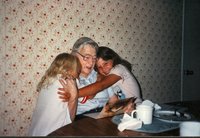Growing Up With Grams
 Dear Rachel,
Dear Rachel,Like many teens and pre-teens, you were kind of a brat and probably a little too smart for your own good. You were often sullen and self-centered, occasionally demanding, and once in a while just plain rude. In other words, pretty much a normal teenager. You seemed to have a problem with authority figures, especially female ones: You were always fine with me, but constantly at loggerheads with your mother, and sullen and sometimes downright nasty with Lesley.
You grew out of that, of course, as most kids do. We’ve often commented on the fact that, seemingly on the day you graduated high school, you somehow instantly became a nice person and a fine young woman.
But I knew it was coming long before that. I knew that there was a good person inside of you several years before you graduated.
During a summer visit when you were around 15 years old, we all went to meet my mother at the airport: you, me, Amy, and Lesley. Grams hadn’t been doing well; her health was failing, and in fact she had only another year or two to live. A lifetime of diabetes and heart trouble had worn her down. You hadn’t seen her in a while and, although we had told you that Grams wasn’t doing well, you weren’t really prepared.
They brought her off the plane and down the jetway in a wheelchair. She looked pale and wan, gray and old, and she peered about myopically, trembling and nervous, almost completely blind and barely able to hold her cane across her lap.
She was sickly-looking and when you saw her you burst into tears. The hardy, ebullient, robust Grams you loved so much was obviously gone, replaced by this frail, fragile, old person who needed a wheelchair to get around and who could no longer see well enough to identify her own grandkids.
You lagged behind as we started off toward the baggage claim area, and Lesley and Amy took care of Grams while I turned back to see if you were OK. You weren’t, of course. You were sobbing, tears streaming down your face; your makeup running all over. I hugged you and patted you on the head and made nonsensical Dad-noises that nonetheless soothed you. You looked up at me and said with a catch in your voice, “Grams is very sick. She’s gonna die!”
I don’t remember what I said to calm you down. No doubt it was something along the lines of, “Well, honey, everybody dies; Grams has lived a long life, and besides, she’s still got a few years in her.” Whatever it was that I said, you quieted down and stopped crying, and we were able to get everyone home. But you stayed very close to Grams during that last visit.
That’s when I knew you were going to grow up just fine, were in fact already in the process of growing up. I realized that you were thinking about someone other than yourself, that someone else’s pain was touching you. That you had suddenly encountered the notion of mortality and that you found the plight of others moving. That’s the mark of an adult.
Love,
Dad


